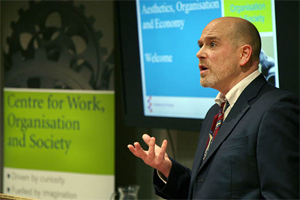
Professor Philip Hancock
Professor Philip Hancock from Essex Business School at the University of Essex will discuss his research into what it is really like to be Santa Claus on the Christmas Day edition of Thinking Allowed on BBC Radio 4.
Leading journal Work Employment and Society has just published his research article “Being Santa Claus”: the pursuit of recognition in interactive service work which provides insights into how performance can make a positive contribution to the service culture in a business. The Observer newspaper and Guardian website has also featured Professor Hancock's research.
As part of his British Academy supported research Professor Hancock interviewed ‘the elite’ of the Santa Claus world at leading department stores, shopping centres and big corporate parties in London and the south east.
He wanted to find out how they felt about their work, the challenges they faced, why they chose to work in such an unusual role and how the job contrasted with other employment.
Professor Hancock said: “What surprised me is that those working as Santa Claus said they had to bring a a degree of authenticity to the role which exceeded anything else they had done. They really have to embody the role and convince children and their parents of the reality of their festive encounter. As one experienced performer said: “You don’t do Santa, you have to be Santa!””
Professor Hancock, who is Professor of Work and Organisation at Essex Business School and Head of the Management, Marketing and Organisation Group, said Santa Claus was perhaps the highest profile example of the roles undertaken in the interactive service sector, where the training and motivation of the employee is vital in forging strong personal connections with customers.
He said: “Customers have increased expectations about high levels of service - the quality of the product you are selling and the service you provide are intertwined.”
Professor Hancock spoke to Santa Claus performers ranging in age from those in their late-50s through to one very experienced performer who was 81-years-old, most were professional or semi-professional actors. The interviews revealed the performers often identified with and drew incredible satisfaction from being the character.
“They like to be recognised for doing a good job, but there is also a sense of overcoming their own limitations and being identified by others as embodying the ideal of Santa Claus – such as his generosity, his sensitivity and being non-judgemental”, he said.
But, these workers also have to tackle any problems without letting their characterisation slip. Professor Hancock said: “They must deal with everything from suggestions of sexual impropriety to aggressive parents and abusive and often violent youths while, all the time, continuing to ‘be Santa’.”
Professor Hancock is interested in mapping the cultural, economic and political dimensions of Christmas. The figure of Santa Claus continues to be central to the global phenomenon of Christmas, which is now often detached from its original religious roots. As a result those working as Santa Claus play a part in continuing to protect the value of this iconic character.
“I have spoken to the shops, shopping centres, agencies, garden centres and festivals who employ Santa Claus performers and they say if performed well a Santa Claus can generate not only significant custom, but also an equally valuable sense of good will and loyalty towards the organisation,” Professor Hancock said.
Links:
The Observer: Secrets of the grotto revealed as study uncovers art of being a successful Santa
BBC Radio 4: Thinking Allowed